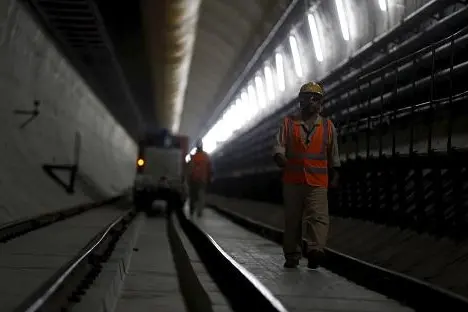PHOTO
The government is stepping up investment in transport infrastructure in Saudi Arabia, fast-tracking key projects and creating new opportunities for service providers.
In July the Saudi Railways Organisation (SRO) conducted the first complete trial run of the Haramain High-Speed Rail. The project connects Jeddah to Medina in just 90 minutes, at speeds of up to 330 km per hour.
Additionally, the next stage of the $17bn Makkah Metro is expected to be put to tender either by the end of this year or in early 2018.
The move to speed up the Makkah Metro project, along with proposals to revitalise development of a 149-km metro network for Jeddah, shows that interest in big-ticket transport projects is returning after two years of constraints due to fiscal tightening, Benjamin Highfield, executive vice-president of construction and business consultancy HKA, told local media.
The government is moving to accelerate the rollout of the network, while also looking to secure alternative funding streams, he added.
NTP envisages greater role for private sector
Transport infrastructure was identified in both the long-term Vision 2030 for economic and social development and the medium-term National Transformation Programme (NTP) as vital to the broader economic overhaul.
The NTP also calls for greater private sector contribution in developing and operating rail projects, targeting a 50% input by 2020, up from 5% currently.
At the infrastructure development stage, that contribution could come through the utilisation of public-private partnerships (PPPs), according to Rumaih Al Rumaih, president of the Public Transport Authority and SRO. Speaking at the Middle East Rail convention in March, Al Rumaih said the PPP model could be used for funding the Makkah and Jeddah metro projects, along with others in the pipeline in Dammam and Medina.
Following a 2016 royal decree, Saudi Railway Company (SAR) is in the process of acquiring ownership of SRO’s assets, including the Haramain High-Speed Rail and the Dammam-Riyadh railway.
In August Bashar Al Malik, chief executive of SAR, announced the company’s intention to invite the private sector to build and operate the $7bn, 958-km Saudi Landbridge project connecting Riyadh to Jeddah, set to begin in early 2018.
Given the significant increase in passenger and freight capacity planned for the coming years, coinciding with the projected rise in demand for rail services, promoting private sector involvement could offer sizeable opportunities to service providers and logistics operators.
Railway expansion aims to improve passenger and freight capacity
Another key objective of the NTP is improving the liveability of Saudi Arabia’s cities by developing comprehensive public transport networks.
The national broad-gauge rail network expansion, which forsees the laying down of 15,000 km of track, will boost freight-handling capacity, as well as long-distance passenger movements.
Rail systems being developed in cities have more localised goals. The Riyadh metro is currently under development and consists of 176 km of track on six separate routes, supported by an expanded bus network. In August the $22.5bn project was 57% completed and is scheduled to open at the end of 2018. Once operational, it will rank as the most extensive mass transport system in the region, with the capacity to carry up to 3.6m passengers a day and the potential to help reduce road traffic congestion by 75%, according to local media reports.
The improved transit network is forecast to have a number of direct knock-on effects for the economy, including an increase in productivity; faster commutes could not only reduce time lost by workers stuck in traffic, but also offer the potential for commercial and office developments away from existing centralised business hubs.
Infrastructure spending projected to reach $14bn
Under the 2017 budget, spending on transport and infrastructure developments has increased, rising from SR37.6bn ($10bn) in outlays in 2016 – up from an initial projected expenditure of SR30.8bn ($8.2bn) – to SR52.1bn ($13.9bn) earmarked for this year. According to the Ministry of Finance’s second quarter update released in mid-August, only 24% of the transport and infrastructure budget was spent in the first half of 2017, leaving SR39.8bn ($10.6bn) still to be spent this year.
The broader transport sector represents a significant segment of the Kingdom’s development pipeline, with a recent MEED report estimating there are more than $63bn worth of sector-related projects in the pre-execution stage.
Of the $250bn in unawarded contracts as of early 2017, transport accounted for 27% of total project volume, trailing only the energy sector (33%) and construction (29%).
Although there had been some challenges to the government’s development plans due to falls in oil revenue, according to MEED the country remained the largest market for projects in the region, representing almost 40% of the GCC total.
© Oxford Business Group 2017





















